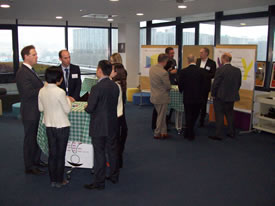 »The word of VUCA sounds very VUCA, while the world of VUCA is really VUCA.«
»The word of VUCA sounds very VUCA, while the world of VUCA is really VUCA.«
That is a very interesting comment shared by one of the participants in the first TrendLab in Shanghai on February 28th, 2014.
Initiated by SYNNECTA, invited by AHK (German Chamber of Commerce), and hosted by Bosch China, the first TrendLab: 21st Century Leadership attracted more than 20 general managers and HR directors from different companies. Dr. Ruediger Muengersdorff, CEO of SYNNECTA GmbH as a chief speaker, shared different trend scenarios with the participants and moderated the rounds of discussion on leadership.
Back to the comment at the very beginning: VUCA (Volatility, Uncertainty, Complexity, Ambiguity) might be the best interpretation of the overall situation of the dynamic world: New technology is accelerating the industries; social media and IT technology connects the world more than ever; customer relationship is getting more challenging and service is much more in focus than products; Generation Y shift their needs and more and more get into management role … speed, development, change, trust are all keywords in China.
What will be the future challenges in leading companies in China? Take Generation Y as an example. Generation Y in China mostly mean the post-80’s, the generation who were born under the one-child policy, used to be the »little emperor« in a family. The need of them in a company is not to make money any more but to identify, is not to be a worker but more to be an explorer. Compared with the post-70’s, post-60’s, they have more willingness to show their opinions and need more recognition. How to find out their motivators to drive them forward, how to link them rather to the company than to the managers are the challenges for leadership. The crucial challenges for managers are how to gain more confidence and trust and how to support their employees in their development. How to motivate employees and how to find the right person for the right task? Self-steered work in projects might be an idea – if passion they have is not constant enough, achievment and responsibility are important to drive associates. Beside these, mentorship is a very hot topic which participants expected a lot to develop in companies in China.
Looking forward to the future, to developlocal decision power, to enhance China R&D, inter-culture knowledge and experience are all challenges and development trends for leadership in China.
The participants agreed that the TrendLab provoked a lot of thoughts and were keen on continuing cross-company discussions to stimulate innovation and to better prepare for the changing leadership role in the 21st century.
Vicky Qian
